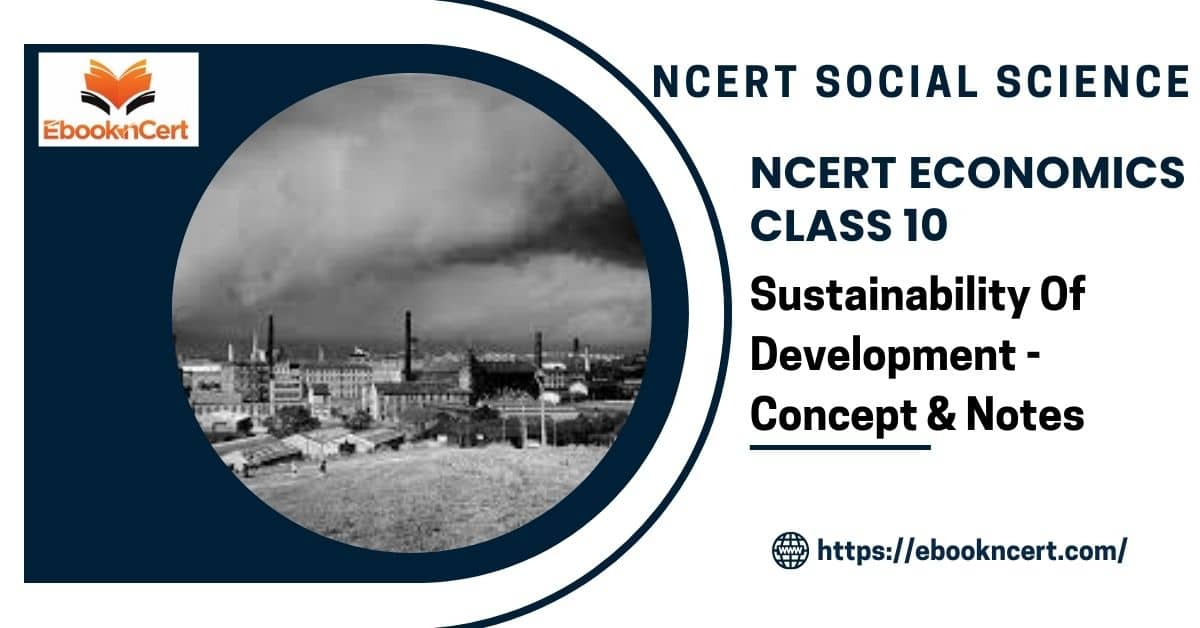NCERT Economics Class 10 | Sustainability Of Development Notes
Topic & sub-topics covered: Sustainability Of Development, Resources: Development (All single detail notes are exam-oriented).
We have discussed in-depth and exam-oriented pointers that can be asked in the board exam of class 10th about “Sustainability Of Development, Resources” which is taken from the NCERT Economics for class 10th chapter no. 1 “Development“.
Download NCERT Economics Chapter 1 Class 10th Notes PDF for “Development”
Embark on a journey to understand the intricate dynamics of economic development with NCERT Economics Chapter 1 Class 10th Notes. Delving into the essence of “Development,” these notes offer a comprehensive overview of key concepts, theories, and real-world examples.
Download NCERT Class 10 Economics Chapter 1 Notes Development Economics Class 10 Chapter 1 Notes PDF
Available in PDF format, these notes provide a convenient and accessible resource for Class 10th students to enhance their understanding, facilitate revision, and excel in their studies. Download NCERT Economics Chapter 1 Class 10th Notes PDF now and unlock the keys to comprehending the dynamics of development in the global context.
Sustainability Of Development
1. Desire for Continuous Development:
- Nations aspire for continuous development, aiming to enhance their current level or at least sustain it for future generations.
2. Importance of Sustainable Development:
- Scientists have raised concerns about the sustainability of current development practices since the latter half of the twentieth century.
3. Recognition of Unsustainable Development:
- There is growing acknowledgement that the existing type and levels of development may not be sustainable in the long term.
4. Need for Sustainable Practices:
- The imperative to adopt sustainable development practices arises from the realization that unsustainable practices may lead to adverse consequences in the future.
Resources
1. Renewable Resources:
- Groundwater serves as a prime example of renewable resources.
- These resources, like crops and plants, are replenished naturally by processes such as rainfall.
2. Overuse of Resources:
- Despite being renewable, resources like groundwater can be overused.
- Overuse occurs when the consumption surpasses the replenishment rate, leading to depletion.
3. Non-Renewable Resources:
- Non-renewable resources are finite and will deplete after a period of use.
- Unlike renewable resources, their stock cannot be naturally replenished over time.
4. Resource Depletion:
- Even with the discovery of new resources, the overall stock of non-renewable resources diminishes over time due to continuous extraction.
5. Global Consequences of Environmental Degradation:
- Environmental degradation affects regions and nations indiscriminately, disregarding national or state boundaries.
- This global interconnectedness emphasizes the shared responsibility for environmental sustainability.
6. Interdisciplinary Approach to Sustainability:
- Sustainability of development is a contemporary field where scientists, economists, philosophers, and social scientists collaborate to address environmental challenges.
7. Perpetual Debate on Development:
- The discourse on development and progress remains ongoing, requiring continuous reflection on societal goals and aspirations.
- Individuals and societies must consistently assess their desired trajectory and long-term objectives amidst evolving environmental concerns.
Next & Previous Topics of NCERT/CBSE Economics Class 10 Chapter 1: Development
FAQs
Q1. Why do nations aspire for continuous development, and what are the implications?
Answer: Nations seek continuous development to enhance their current level or sustain it for future generations, highlighting the importance of sustainable practices.
Q2. What concerns have scientists raised about current development practices?
Answer: Scientists have raised concerns about the sustainability of current development practices since the latter half of the twentieth century, emphasizing the need for sustainable development.
Q3. Why is there growing recognition of the unsustainability of existing development levels?
Answer: There is growing acknowledgement that existing development levels may not be sustainable in the long term, prompting the need for sustainable practices to mitigate adverse consequences.
Q4. How do non-renewable resources differ from renewable resources?
Answer: Non-renewable resources, unlike renewable ones, are finite and deplete over time with continuous extraction, highlighting the need for conservation efforts.
Q5. What factors contribute to the depletion of non-renewable resources despite the discovery of new reserves?
Answer: Despite new discoveries, continuous extraction leads to the overall depletion of non-renewable resources over time, highlighting the need for conservation and alternative solutions.

